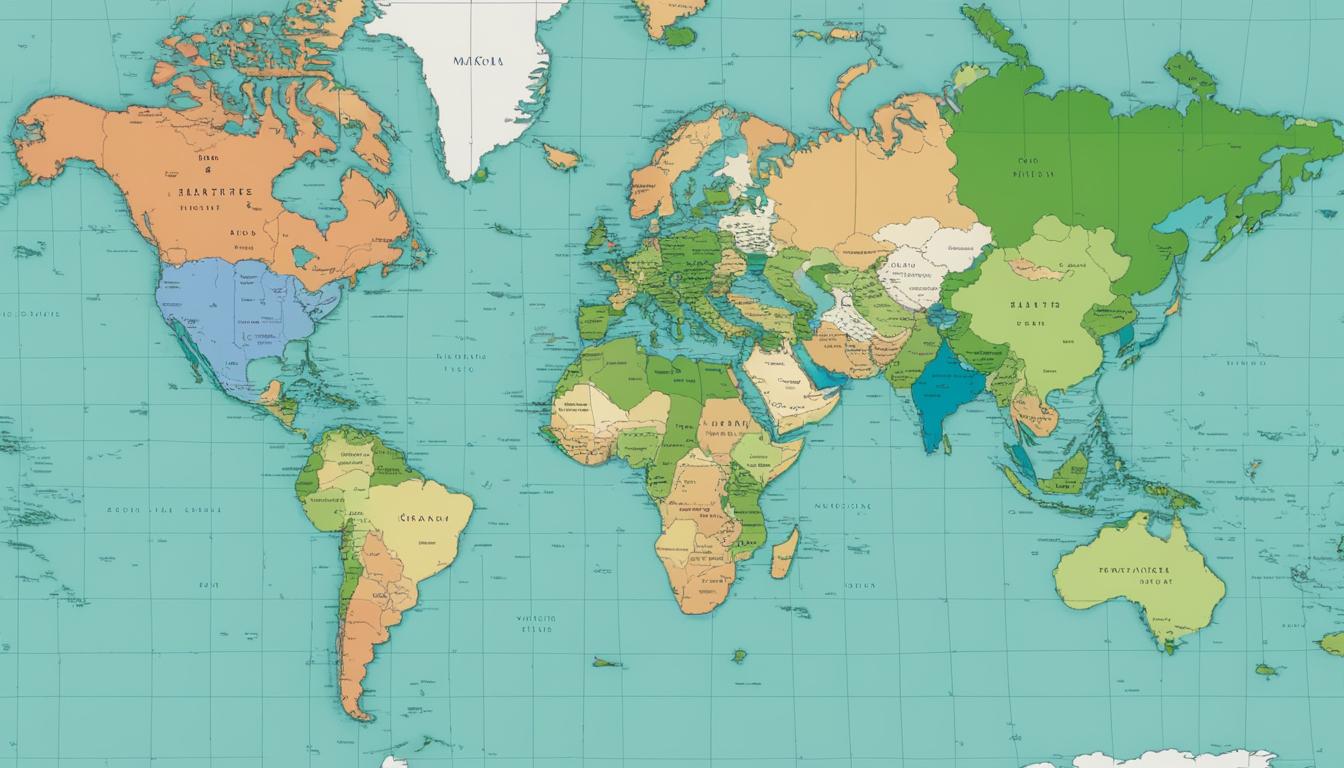Discover Countries with Free Healthcare Around the World

Access to quality healthcare is essential for every individual. However, for many, this remains a luxury due to the high costs associated with medical treatments and procedures. Fortunately, several countries around the world offer free healthcare to their citizens. These countries have healthcare systems that prioritize healthcare access, and their citizens receive comprehensive healthcare coverage.
Universal healthcare is a concept that is becoming increasingly popular globally. It is a system that ensures all citizens have access to healthcare regardless of their income or social status. Countries with free healthcare have adopted this system and provide healthcare services to their citizens without charging them any fees.
In this section, we will explore the healthcare systems of countries that offer free healthcare, the concept of universal healthcare, and the extent of healthcare coverage provided by these countries. We will delve into how these countries finance their healthcare services and examine the challenges and successes of publicly funded healthcare systems.
Key Takeaways:
- Countries with free healthcare offer comprehensive healthcare coverage to their citizens.
- Universal healthcare is a system that prioritizes healthcare access for all citizens, regardless of income or social status.
- Publicly funded healthcare systems play a crucial role in ensuring healthcare access for all.
- Countries with free healthcare face challenges in sustaining their healthcare systems, but these countries have also achieved significant successes.
- The concept of healthcare for all is essential in creating healthier societies.
Understanding Universal Healthcare and its Benefits
Universal healthcare is a healthcare system in which all residents of a country have access to healthcare services without financial hardship. This means that regardless of your income or social status, you are entitled to receive comprehensive healthcare services.
One of the main benefits of universal healthcare is that it provides healthcare coverage for all citizens. Under this system, everyone has access to medical care, preventive services, and public health programs, which can improve overall health outcomes and reduce healthcare costs.
Universal healthcare systems are typically publicly funded and provide a range of healthcare services, including but not limited to doctor visits, hospital care, and prescription drugs. By prioritizing access to healthcare for all, these systems can improve healthcare outcomes, reduce mortality rates, and enhance overall public health.
How Universal Healthcare Systems Work
In countries with universal healthcare systems, the government is responsible for financing and administering healthcare services. This means that healthcare providers are often public institutions that are funded by the government. In some cases, the government also regulates the prices of medical services and prescription drugs to ensure that they are affordable for all.
Universal healthcare systems typically prioritize preventative care, which can reduce the need for expensive medical treatments and hospitalizations. This means that the focus is on keeping people healthy and preventing illness, rather than simply treating disease after it occurs.
Overall, universal healthcare systems aim to provide comprehensive healthcare coverage to all citizens, regardless of their ability to pay. By doing so, they can improve the health and well-being of their populations and create a healthier society for all.

Universal healthcare systems have been implemented in many countries around the world, including Canada, the United Kingdom, and Australia. Each of these systems has its own unique features and challenges, but they all share the goal of providing comprehensive healthcare coverage for all citizens.
In the next section, we will explore how government-funded healthcare systems work and the role of government funding in ensuring healthcare access for all.
Government-Funded Healthcare Systems
One of the defining features of countries with free healthcare is their government-funded healthcare systems. These systems are designed to ensure that all citizens have access to essential healthcare services without having to bear the burden of exorbitant medical costs. In many cases, these systems are funded through taxes or other forms of public revenue.
Government funding plays a critical role in ensuring that healthcare services are available to everyone, regardless of their income level or social status. This means that citizens can access healthcare services when they need them, and healthcare providers can focus on delivering quality care rather than worrying about the financial aspects of their job.
However, government funding is not the only factor that determines the effectiveness of these healthcare systems. The range of healthcare services provided is also a critical factor in ensuring that citizens receive the care they need. Countries with free healthcare generally offer a broad range of services, including preventative care, primary care, and specialized care.
These healthcare services are typically delivered through a combination of public and private providers. While government-funded healthcare covers the basic healthcare needs of citizens, private healthcare providers can offer additional services to those who require them. This combination creates a healthcare system that is both comprehensive and flexible, allowing citizens to access the care they need when they need it.
The Role of Healthcare Services
Healthcare services also play an essential role in maintaining the overall health of citizens. Preventive care services, such as immunizations and regular check-ups, can detect health problems early and prevent them from becoming more severe. Primary care services, such as family medicine and pediatrics, provide ongoing care to individuals and families, helping them manage chronic conditions and stay healthy.
Specialized care services, such as surgery and oncology, provide essential care to individuals who require more advanced treatments. These services are especially critical in countries with free healthcare, as they ensure that citizens receive the care they need and that their healthcare system remains sustainable.
The Range of Healthcare Services
The range of healthcare services provided by countries with free healthcare can vary widely. Some countries offer only basic healthcare services, such as primary care and emergency services. Others offer a full range of services, including specialized care, dental care, and mental health services.
Regardless of the range of services provided, countries with free healthcare share a commitment to ensuring that all citizens have access to quality healthcare services. This commitment is reflected in the range of services offered and the funding mechanisms used to provide them.
Countries with Free Healthcare: A Comparative Analysis
While there are various countries around the world that offer free healthcare to their citizens, the extent of healthcare coverage and the quality of healthcare services provided can vary significantly. In this section, we will compare the healthcare systems of different countries with free healthcare and explore the variations in healthcare coverage and quality of services.
Canada
Canada is known for its publicly funded healthcare system, which provides universal coverage for all citizens and permanent residents. While the system is funded by the government, the delivery of healthcare services is provided by private entities, such as doctors and hospitals. While the system has been successful in providing basic healthcare services to all citizens, there have been challenges in addressing long wait times for specialized treatments and procedures.
United Kingdom
The National Health Service (NHS) in the United Kingdom provides comprehensive healthcare services to all citizens, free at the point of use. The NHS is funded by the government and provides a range of services, from basic healthcare to specialized treatments and procedures. While the NHS has been successful in providing healthcare access to all citizens, it has faced challenges in managing the increasing demand for healthcare services and maintaining quality of care.
Cuba
Cuba is known for its government-funded healthcare system, which provides universal coverage to all citizens. The system is focused on providing preventive healthcare and has been successful in achieving population health outcomes comparable to developed countries. However, the healthcare system faces challenges in delivering specialized treatments and procedures due to limited resources and the impact of international economic sanctions.
Healthcare for All: Achieving Comprehensive Coverage
Countries with free healthcare prioritize healthcare access for all their citizens through publicly-funded healthcare systems. These countries recognize that comprehensive coverage is essential for maintaining the health and well-being of their populations.
Healthcare for all means that every citizen has access to healthcare services without financial barriers. This concept recognizes that healthcare is a basic human right, and no one should be denied healthcare due to their financial status.
Publicly-funded healthcare systems are the backbone of countries with free healthcare. These systems are financed through government funding and provide healthcare services to all citizens regardless of their ability to pay. This ensures that no person is left behind and everyone has equal access to healthcare.
Achieving comprehensive coverage in countries with free healthcare requires a commitment to investing in healthcare services. This includes ensuring an adequate supply of healthcare professionals, investing in medical technologies, and providing preventive care services. It also requires addressing any disparities in healthcare access and addressing social determinants of health that may prevent some individuals from accessing healthcare services.

However, achieving comprehensive coverage is not without its challenges. Publicly-funded healthcare systems may face financial constraints and resource limitations, resulting in longer wait times for certain healthcare services. Additionally, political and social factors may impact the provision of healthcare services, such as healthcare provider shortages or political unrest.
Despite these challenges, countries with free healthcare continue to strive for comprehensive coverage and healthcare for all. These countries recognize the importance of prioritizing healthcare access for all citizens and investing in the health of their populations.
Challenges and Successes in Countries with Free Healthcare
Providing free healthcare to all citizens is a complex task that presents both challenges and successes for countries with publicly funded healthcare. These healthcare systems rely heavily on government funding, which can be limited and create sustainability issues.
The Challenges
One of the main challenges faced by countries with free healthcare is the cost of providing comprehensive healthcare services to all citizens. This often requires significant government funding, which can be difficult to sustain in the long term. As a result, some countries have had to limit the scope of healthcare services provided or introduce additional fees to cover costs.
Another challenge is ensuring that healthcare providers are adequately compensated for their services. In some countries, healthcare providers may be underpaid or overworked, leading to burnout and lower-quality care for patients. Additionally, there may be shortages of healthcare professionals, particularly in rural or remote areas.
The Successes
Despite these challenges, countries with free healthcare have also experienced significant successes. One of the key benefits of publicly funded healthcare is that it prioritizes healthcare access for all citizens, regardless of income or social status. This can lead to better health outcomes and a more equitable society.
Another success is the focus on preventative healthcare measures. Countries with free healthcare often prioritize preventative services, such as regular check-ups and screenings, to help identify and treat health issues before they become more serious and costly to address.
Moreover, countries with free healthcare often have better health outcomes overall. For example, life expectancy is higher in countries with universal healthcare compared to those without it. This is likely due to the increased access to healthcare services and preventative measures.
Overall Satisfaction
Despite the challenges, citizens of countries with free healthcare generally report high levels of satisfaction with their healthcare systems. This is because these systems provide healthcare access to all citizens, regardless of their financial situation or social status. Additionally, healthcare costs are often significantly lower in countries with free healthcare than in countries without it, reducing financial burden on individuals and families.
Countries with free healthcare also tend to have a strong sense of community and social responsibility. When everyone has access to healthcare services, it creates a more cohesive and supportive society.
Overall, while countries with free healthcare face challenges in sustaining and providing comprehensive healthcare services, there are also many successes to be celebrated. These systems prioritize healthcare access for all citizens and have been shown to lead to better health outcomes overall.
Conclusion: The Future of Free Healthcare
As we explored, countries with free healthcare offer comprehensive healthcare services to their citizens, prioritizing healthcare access for all. The sustainability of these healthcare systems, however, remains a challenge and requires ongoing efforts to maintain and improve.
The future of free healthcare is promising, with potential for expanding comprehensive healthcare services to more citizens. With a focus on preventative care, these healthcare systems can further improve the health outcomes of their populations while reducing healthcare costs.
As the United States continues to navigate its own healthcare system, there is much to learn from countries with free healthcare. Prioritizing healthcare for all is crucial in creating healthier and more equitable societies.
Takeaway
Comprehensive healthcare coverage is essential for the wellbeing of citizens and the prosperity of nations. Countries with free healthcare have demonstrated the potential for healthcare systems that prioritize healthcare access for all. By investing in healthcare and prioritizing preventative care, the United States can move towards a healthier and more equitable future.
FAQ
What is universal healthcare?
Universal healthcare refers to a healthcare system that provides healthcare services to all citizens of a country, regardless of their ability to pay. It aims to ensure that everyone has access to necessary medical care without facing financial barriers.
Which countries offer free healthcare?
Several countries around the world offer free healthcare to their citizens, including Canada, the United Kingdom, Australia, and Sweden, among others.
Is the healthcare coverage provided by these countries comprehensive?
Yes, the healthcare coverage provided by these countries is generally comprehensive. It includes a wide range of medical services, such as doctor visits, hospitalizations, preventive care, and prescription medications.
How do countries finance their healthcare systems?
Countries with free healthcare typically finance their healthcare systems through taxation. Government funding ensures that healthcare services are available to all citizens, regardless of their income level.
Are there variations in the quality of healthcare services among countries with free healthcare?
While the overall quality of healthcare services is generally high in countries with free healthcare, there may be some variations. Factors such as wait times for certain procedures and access to specialized treatments can vary between countries.
Do countries with free healthcare face any challenges in sustaining their healthcare systems?
Yes, countries with free healthcare face challenges in sustaining their healthcare systems. These challenges include rising healthcare costs, an aging population, and increasing demand for healthcare services.
How do countries ensure healthcare access for all citizens?
Countries with free healthcare take measures to ensure healthcare access for all citizens. This includes implementing policies that prioritize healthcare as a fundamental right and establishing comprehensive healthcare coverage that is accessible to everyone.
Are citizens satisfied with the healthcare services provided by countries with free healthcare?
Generally, citizens in countries with free healthcare report high levels of satisfaction with their healthcare services. However, like any healthcare system, there may be individual experiences and preferences that vary.
What is the future of free healthcare?
The future of free healthcare involves expanding comprehensive healthcare services and ensuring healthcare access for all. As societies recognize the importance of healthcare for the well-being of their citizens, there is a growing emphasis on creating sustainable and effective healthcare systems.



